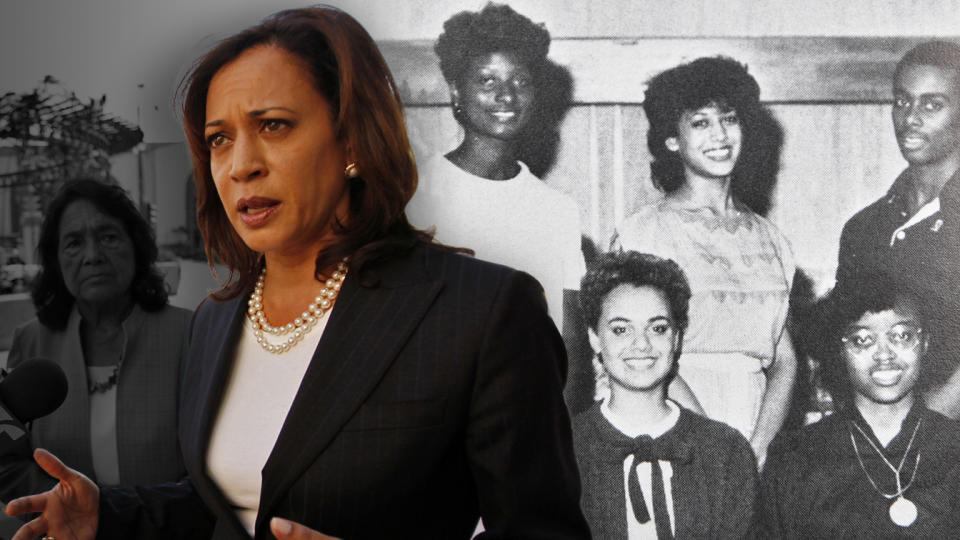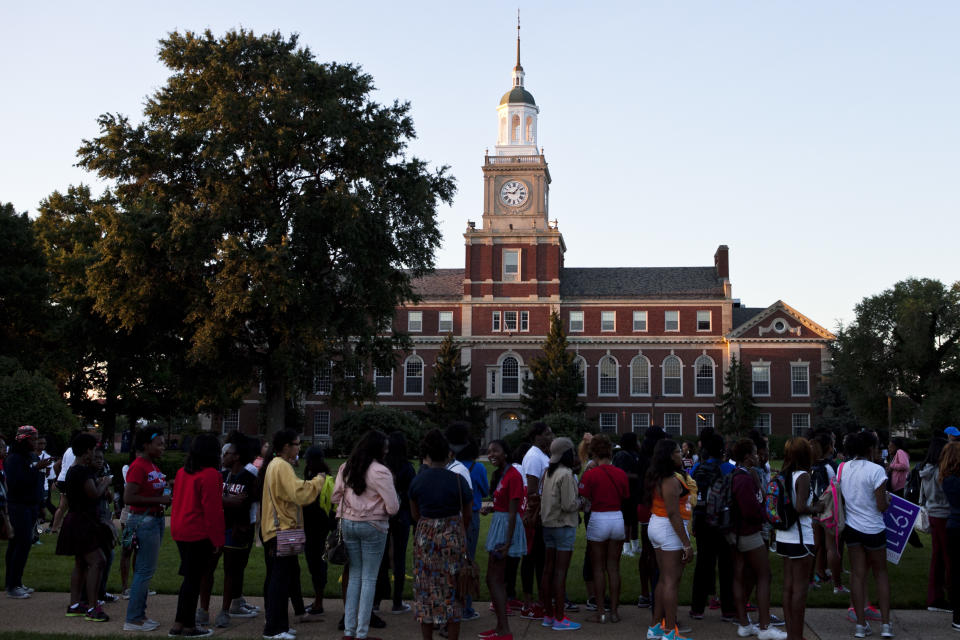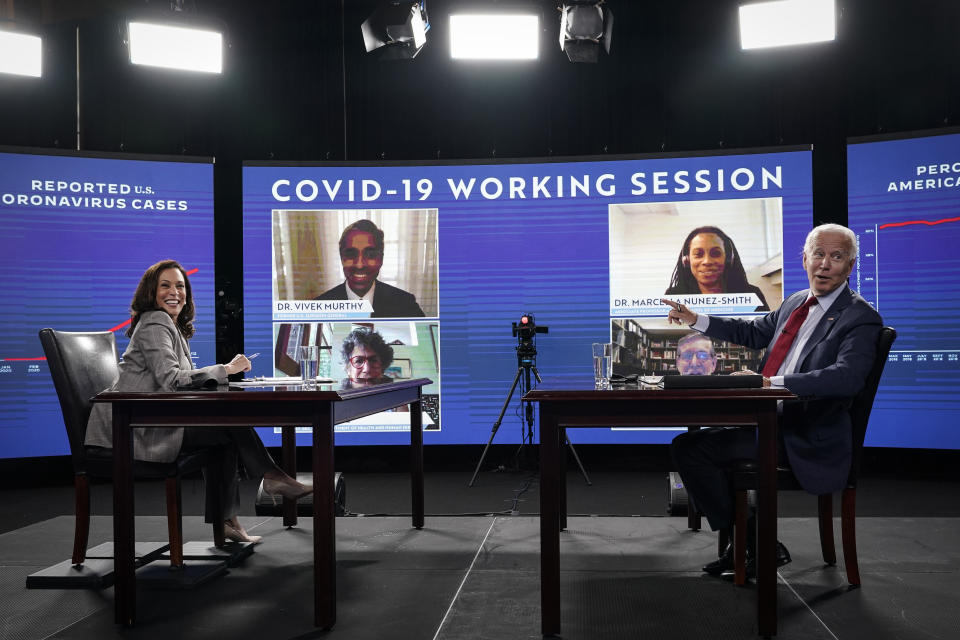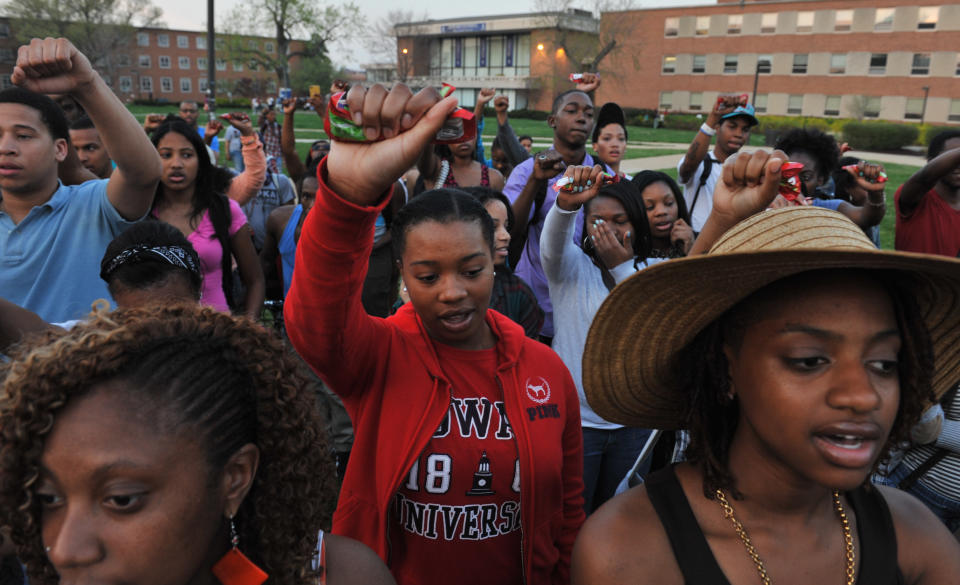Kamala Harris carries the pride of America’s HBCUs into the race for the White House
Sen. Kamala Harris understands what it means to be a trailblazer. Last week, she became the first Black woman to accept a major party’s nomination for vice president, as well as the first Indian-American to appear on a presidential ticket. But being the first to do something is nothing new to Harris. Long before this year’s presidential run, Harris became the first in several other categories.
In 2003, Harris became the first woman and first African-American to be elected district attorney in San Francisco. In 2010, Harris was the first woman and the first Black person elected as California’s attorney general, the top lawyer in the country’s most populous state. Then in 2016, Harris became the first South Asian-American and the second African-American woman to serve in the United States Senate. Like many students who attended a historically Black college or university, or HCBU, Harris’ drive to break barriers can be traced back to her years at Howard University.

Harris is the daughter of immigrant parents who emigrated to the U.S. from Jamaica and India. Both of her parents attended the University of California, Berkeley, where they met, and were actively involved in the Civil Rights Movement. Harris and her younger sister attended majority-white schools their entire life, from elementary school in Berkeley, Calif., to high school in Montreal, Canada. But Harris wanted a different experience in college — a Black one.
Harris found that Black experience in the nation’s capital at Howard, one of the largest and wealthiest HBCUs. Yet she is the first alumna of a historically Black college or university on a major party presidential ticket. In fact, this is the first Democratic ticket since 1984 without an Ivy League grad.
On Tuesday, Harris watched the virtual Democratic National Convention at home on her couch in her college hoodie, with “Howard” embroidered across her chest.
Kamala is loving this roll call. pic.twitter.com/sQtGnrKLAx
— Doug Emhoff (@DouglasEmhoff) August 19, 2020
On Wednesday, during her acceptance speech for the vice presidential nomination, Harris highlighted the relationships she forged while at her sorority at Howard and singled out her affection for America’s nine historically Black fraternities and sororities.
“Family is my beloved Alpha Kappa Alpha, our Divine Nine, and my HBCU brothers and sisters,” Harris said.
In her 2019 memoir “The Truths We Hold: An American Journey,” Harris wrote of Howard’s impact on her life.
“That was the beauty of Howard,” Harris wrote, adding, “Every signal told students that we could be anything — that we were young, gifted, and Black, and we shouldn’t let anything get in the way of our success.”
Founded in Cheney, Pa., in 1837, the Institute for Colored Youth (Cheney University today) was the country’s first school of higher education for Black people. Most HBCUs did not emerge until the period of Reconstruction following the Civil War, however. Today, there are more than 100 HBCUs all over the United States of America.
Howard Henderson, professor of justice administration at Texas Southern University, an HBCU in Houston, Texas, and director of the Center for Justice Research believes that the HBCU experience prepared Harris for the kind of racial inequities and health challenges the country is currently going through.
“HBCUs are uniquely situated to solve many of today’s problems,” Henderson said. “If you look at what’s happening around us, you see record unemployment, a pandemic and you see the African-American community being directly impacted in both of those spaces. If you think about who is going to solve a problem, you think initially about historical Black colleges and universities, because we share the lived experiences.”
Henderson added that he thinks Harris will serve as a model to the nation for the kind of students who are made at HBCUs.
“[Harris] will be able to provide an example of just the kind of students that are matriculating through our historical Black colleges and universities in this country,” Henderson said. “Much of America’s history and socio-economic movements have been driven to serve as a response to efforts of members of the historically Black colleges and universities. Keep in mind that the research that we produce at historical Black colleges and universities provides a culturally responsive perspective to many of the challenges that are facing historically disenfranchised communities.”

Attorney Lita Rosario, a former Howard University classmate of Harris’, said the school’s alumni think highly of their degrees because they regard Howard as “the Harvard of HBCUs.” Rosario once recruited Harris for the university’s debate team because of the way she carried herself.
“Kamala had the ability to deal with [overpowering men] and to state her mind and be very cogent and succinct,” Rosario recalled. “I think there’s a commitment to excellence at Howard and a drive and commitment towards change. That certainly is a part of the calmness in her personality.”
Her poise, many believe, is an innate characteristic that helps make Black women natural leaders.
“Black women bring their authentic selves when they govern and when they lead,” Glynda Carr, president, CEO and founder of Higher Heights for America and board member of ReflectUS told Yahoo News in an interview. “We are truth tellers in the spirit of Shirley Chisholm. Black women literally will speak truth to power and they do that as advocates, as activists, and they certainly bring that to city halls, state houses and Washington in a very unique way.”
On its website, Higher Heights for America says it is the only national organization dedicated to expanding “elected representation and voting participation” for Black women. To that end, Higher Heights lobbied for Biden to select a Black woman as his running mate, and the organization’s partner PAC previously endorsed Harris for president in the Democratic primary.
“The announcement of Kamala Harris being [Biden’s] running mate shows that [she] is ready to lead on day one and prepared to bring her unique experiences to the ticket as the running mate,” Carr said.

While there are plenty of bright spots that surround HBCUs, there are mirroring enrollment and financial challenges to support these spaces. HBCUs saw their population drop 11 percent between 2010 and 2018 compared to 7 percent at other degree-granting institutions, according to the National Center for Education Statistics.
The combined endowment of all 101 HBCUs is $3.86 billion, roughly half the size of that of Washington University in St. Louis, a school with fewer than 8,000 students, according to Bloomberg. Howard University has long been sustained by a congressional appropriation, now totaling more than $220 million per year. But not every HBCU has access to this kind of capital.
Journalist Ron Stodghill, author of “Where Everybody Looks Like Me: At the Crossroads of America's Black Colleges and Culture” believes it’s unfair to compare the endowment of HBCUs to that of predominantly white institutions (PWIs).
“A lot of HBCUs are teaching universities,” Stodghill said in an interview with Yahoo News. “They’re not research universities. So it’s kind of an apples and oranges comparison often because at those research universities, they’re generating science and patents that bring huge amounts of dollars. ... [At HBCUs, often] there are no graduate schools and PhDs.”
But Stodghill believes if there is anyone who can ease the financial strain of historically Black colleges and universities, it’s Harris.
“I think HBCUs could use a morale boost right now,” he said. “We’re in the middle of a pandemic. They’ve always been kind of fragile financially. So to put them in a position where they get a level of prominence that she brings is a great thing. I also think that, uh, probably since … if [Harris and Biden] were to wind up in the White House, I think it’d be an epic moment full of possibility.”

As vice president, Harris would be in a better position to help HBCUs in a meaningful way. While in the Senate, she introduced and passed legislation to help improve historic HBCU buildings and sought additional federal funding for these schools.
Biden’s higher education plan calls for the investment of $70 billion in historically Black colleges and universities to close the funding disparity between them and predominately white institutions. In the plan, $10 billion would go toward funding retention, enrollment and job placement for alumni.
Rep. Alma Adams of North Carolina, a proud North Carolina A&T graduate and member of Alpha Kappa Alpha Sorority Inc., says that despite funding challenges for HBCUs, the institutions have found a way to make it work.
“Our schools are well over 150 years old,” Adams said. “We’ve got nine or 10 celebrating 150 years. So we have always done a lot with the little. We shouldn’t have been, but there’s always been inequity in terms of funding, whether it’s been public funding from the governments or local state and even federal government. … Hopefully, we’ll be able to bring back some leveling of the playing field.”
Adams founded the bipartisan HBCU Caucus in Congress and taught 40 years at Bennett College, an HBCU in North Carolina. She received two degrees at North Carolina A&T, and her grandson currently attends Howard University. Adams believes HBCUs are needed now more than ever.
“I was the poor Black girl growing up in the ghetto and now able to walk the halls of Congress,” Adams said. “I went on to do my PhD at the Ohio State University, but only because of the North Carolina A&T [experience], an HBCU. We have a history of really molding and shaping and making those kinds of investments.”
HBCUs continue to play a significant role in the goal of attaining a more equitable society. While their enrollment accounts for just 3 percent of all four-year nonprofit colleges, their alumni make up roughly 80 percent of all Black judges and 50 percent of Black lawyers and doctors. HBCU students account for 25 percent of Black undergraduates nationwide who earn degrees in STEM (science, technology, engineering and mathematics), according to the Thurgood Marshall College Fund.
“[Harris and Biden] will need to capture the imagination of young people, and present ideas for a better future that will resonate with people who will occupy this nation for the next 50-plus years,” said Ivory A. Toldson, professor of counseling psychology at Howard University. “As the nation becomes more culturally diverse and technologically savvy, a new generation will have to find solutions to emerging issues, such as globalization, climate change, the wealth gap, infrastructure, as well as racism, sexism and other isms.”
In 2013, Toldson was appointed by former President Barack Obama to devise national strategies to sustain and expand federal support to HBCUs as the executive director of the White House Initiative on Historically Black Colleges and Universities (WHIHBCUs). As part of these initiatives, Toldson served on Obama’s My Brother’s Keeper Initiative task force.
“Many young people are concerned about the future and want to be a part of the solutions,” Toldson added. “MBK began in the White House, but had decentralized control that empowered local leaders. VP Biden and Sen. Harris can learn from that approach.”

Arisha Hatch, executive director of Color Of Change PAC, an organization working to elect candidates who share values of building up the Black community, believes that Harris’ experience at Howard proves she will work for the betterment of HBCUs.
“When I see HBCU alumni, I see a great deal of pride in their heritage and in their school,” Hatch said. “I see folks who are intelligent and they have grown up loving Black people and Black culture. ... I believe with Sen. Harris on the ticket that Black people can go to sleep at night that she cares about us.”
Adunola Rachel Osinuga of Texas Southern University, co-chair of “HBCUs for Biden”, is part of a trio of students leading the effort to recruit and organize supporters on campuses across the country. Osinuga believes Harris exemplifies the magic of HBCUs.
“Everything is beautiful in its time,” Osinuga said. “The significance and splendor of our beloved HBCUs have always produced some of the greatest minds the world has ever seen. [There’s] too many to name and yet threaded throughout the fabric of this nation, Harris like so many, are the fruits of their labor.”
_____
Read more from Yahoo News:

 Yahoo Sports
Yahoo Sports 

